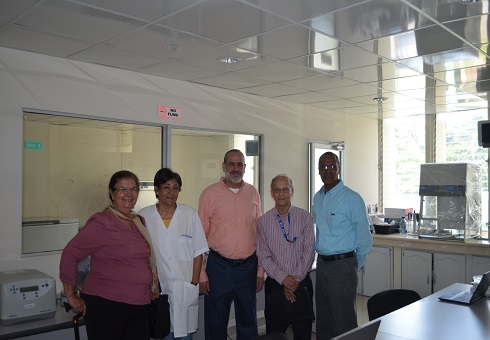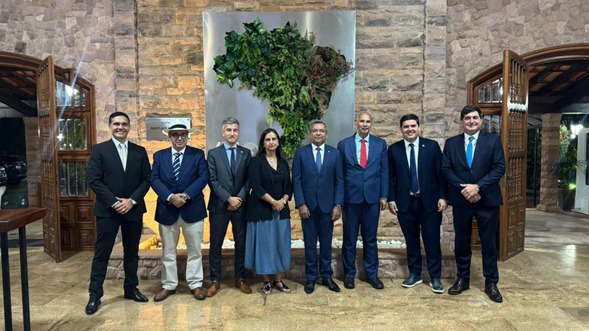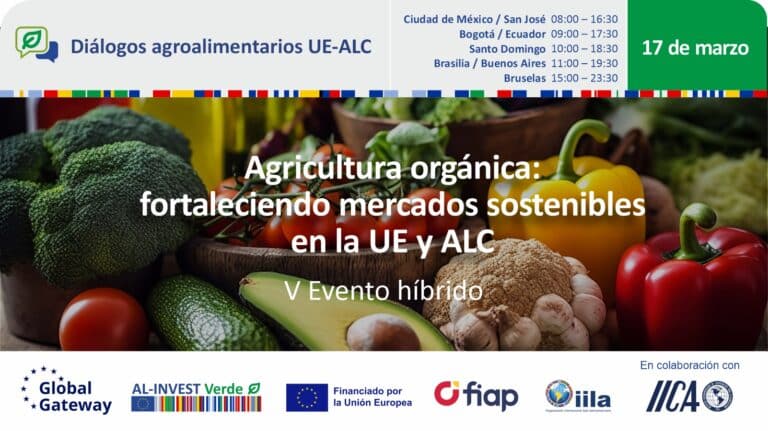Specialized consultants of international recognition visited the Dominican Republic to train technicians and representatives of institutions in the Cocoa sector for the creation of an integrated surveillance system and the elaboration of an Emergency Phytosanitary Response Plan against Moniliasis of Cocoa

against Moniliasis del Cacao, which took place at the IICA Dominican Republic in the
Videoconference Room from 7 to 8 December, 2017.
Santo Domingo, Dominican Republic, December, 2017 (IICA). Within the framework of the Project “Strengthening of the Surveillance Capacity and Emergency Response to the Introduction of the Moniliasis of Cocoa in the Dominican Republic”, which is financed by the United States Department of Agriculture (USDA) through the Ministry of Economy, Planning and Development (MEPyD), the IICA Dominican Republic Delegation hired Dr. Carmen Suárez Capello, an specialized consultant of international recognition on Moniliasis of Cocoa, who, together with Dr. Ericka Calderón from IICA and Dr. Juan Carlos Murillo from World Animal Protection gave a workshop on Good Emergency Management Practices (GEMP), focused on facilitating the elaboration of a Phytosanitary Emergency Response Plan against Moniliasis of Cocoa.
The workshop took place on December 7-8, 2017 at the IICA Dominican Republic Delegation Videoconference Room, with the participation of 33 participants, representatives of the Department of Plant Health and the Cocoa Department of the Ministry of Agriculture, as well as representatives of the National Cacao Commission and cocoa producers who highlighted the importance of being trained in the GEMP System under this Project as part of the preparation of the Phytosanitary Emergency Plan against Moniliasis of Cocoa, since this is a key moment of high phytosanitary risk.
 During the week of December 4-8, 2017, Dr. Carmen Suárez Capello visited the Dominican Republic to have working meetings with technicians and officials of the different public and private institutions working in the cocoa sector, including specific visits to the phytosanitary and molecular biology diagnostic laboratories of the Vegetable Plant Research Laboratory at the Las Americas International Airport, the Phytosanitary Diagnostic Laboratory of the Autonomous University of Santo Domingo, and the Dominican Institute of Agricultural and Forestry Research (IDIAF) in order to analyze and evaluate the diagnostic capacity and inter-agency coordination mechanisms to prevent the introduction, or eventually detect, the presence of Moniliasis in Cocoa in the country.
During the week of December 4-8, 2017, Dr. Carmen Suárez Capello visited the Dominican Republic to have working meetings with technicians and officials of the different public and private institutions working in the cocoa sector, including specific visits to the phytosanitary and molecular biology diagnostic laboratories of the Vegetable Plant Research Laboratory at the Las Americas International Airport, the Phytosanitary Diagnostic Laboratory of the Autonomous University of Santo Domingo, and the Dominican Institute of Agricultural and Forestry Research (IDIAF) in order to analyze and evaluate the diagnostic capacity and inter-agency coordination mechanisms to prevent the introduction, or eventually detect, the presence of Moniliasis in Cocoa in the country.

Ing. Mayra Castillo, Eng. Luís Matos, Dr. Dileccio Vanderlinder and Dr. Julio Borbón.
The project will culminate in February 2018 with the elaboration of a phytosanitary emergency plan against Moniliasis of Cocoa and the development of two cabinet drills in two zones of high production of cocoa in the countryside, which will serve the purposes of testing the emergency plan against the disease and to evaluate the response capacity of the stakeholders involved in the process.
More information: Dileccio Vanderlinder, Specialist in Agricultural Health and Food Safety, dileccio.vanderlinder@iica.int











